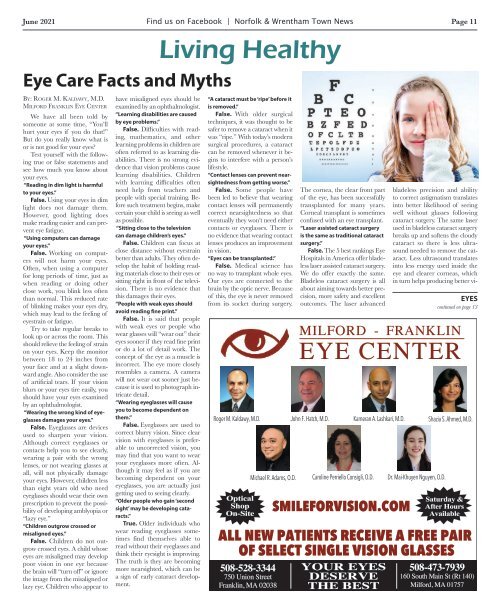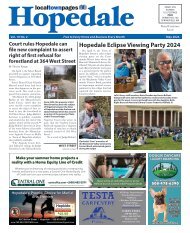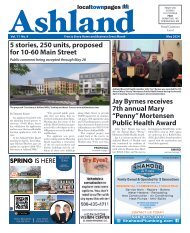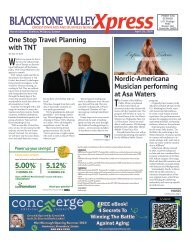Norfolk & Wrentham June Issue
Norfolk & Wrentham June Issue
Norfolk & Wrentham June Issue
Create successful ePaper yourself
Turn your PDF publications into a flip-book with our unique Google optimized e-Paper software.
<strong>June</strong> 2021 Find us on Facebook | <strong>Norfolk</strong> & <strong>Wrentham</strong> Town News Page 11<br />
Eye Care Facts and Myths<br />
By: Roger M. Kaldawy, M.D.<br />
Milford Franklin Eye Center<br />
We have all been told by<br />
someone at some time, “You’ll<br />
hurt your eyes if you do that!”<br />
But do you really know what is<br />
or is not good for your eyes?<br />
Test yourself with the following<br />
true or false statements and<br />
see how much you know about<br />
your eyes.<br />
“Reading in dim light is harmful<br />
to your eyes.”<br />
False. Using your eyes in dim<br />
light does not damage them.<br />
However, good lighting does<br />
make reading easier and can prevent<br />
eye fatigue.<br />
“Using computers can damage<br />
your eyes.”<br />
False. Working on computers<br />
will not harm your eyes.<br />
Often, when using a computer<br />
for long periods of time, just as<br />
when reading or doing other<br />
close work, you blink less often<br />
than normal. This reduced rate<br />
of blinking makes your eyes dry,<br />
which may lead to the feeling of<br />
eyestrain or fatigue.<br />
Try to take regular breaks to<br />
look up or across the room. This<br />
should relieve the feeling of strain<br />
on your eyes. Keep the monitor<br />
between 18 to 24 inches from<br />
your face and at a slight downward<br />
angle. Also consider the use<br />
of artificial tears. If your vision<br />
blurs or your eyes tire easily, you<br />
should have your eyes examined<br />
by an ophthalmologist.<br />
“Wearing the wrong kind of eyeglasses<br />
damages your eyes.”<br />
False. Eyeglasses are devices<br />
used to sharpen your vision.<br />
Although correct eyeglasses or<br />
contacts help you to see clearly,<br />
wearing a pair with the wrong<br />
lenses, or not wearing glasses at<br />
all, will not physically damage<br />
your eyes. However, children less<br />
than eight years old who need<br />
eyeglasses should wear their own<br />
prescription to prevent the possibility<br />
of developing amblyopia or<br />
“lazy eye.”<br />
“Children outgrow crossed or<br />
misaligned eyes.”<br />
False. Children do not outgrow<br />
crossed eyes. A child whose<br />
eyes are misaligned may develop<br />
poor vision in one eye because<br />
the brain will “turn off” or ignore<br />
the image from the misaligned or<br />
lazy eye. Children who appear to<br />
have misaligned eyes should be<br />
examined by an ophthalmologist.<br />
“Learning disabilities are caused<br />
by eye problems.”<br />
False. Difficulties with reading,<br />
mathematics, and other<br />
learning problems in children are<br />
often referred to as learning disabilities.<br />
There is no strong evidence<br />
that vision problems cause<br />
learning disabilities. Children<br />
with learning difficulties often<br />
need help from teachers and<br />
people with special training. Before<br />
such treatment begins, make<br />
certain your child is seeing as well<br />
as possible.<br />
“Sitting close to the television<br />
can damage children’s eyes.”<br />
False. Children can focus at<br />
close distance without eyestrain<br />
better than adults. They often develop<br />
the habit of holding reading<br />
materials close to their eyes or<br />
sitting right in front of the television.<br />
There is no evidence that<br />
this damages their eyes.<br />
“People with weak eyes should<br />
avoid reading fine print.”<br />
False. It is said that people<br />
with weak eyes or people who<br />
wear glasses will “wear out” their<br />
eyes sooner if they read fine print<br />
or do a lot of detail work. The<br />
concept of the eye as a muscle is<br />
incorrect. The eye more closely<br />
resembles a camera. A camera<br />
will not wear out sooner just because<br />
it is used to photograph intricate<br />
detail.<br />
“Wearing eyeglasses will cause<br />
you to become dependent on<br />
them.”<br />
False. Eyeglasses are used to<br />
correct blurry vision. Since clear<br />
vision with eyeglasses is preferable<br />
to uncorrected vision, you<br />
may find that you want to wear<br />
your eyeglasses more often. Although<br />
it may feel as if you are<br />
becoming dependent on your<br />
eyeglasses, you are actually just<br />
getting used to seeing clearly.<br />
“Older people who gain ‘second<br />
sight’ may be developing cataracts.”<br />
True. Older individuals who<br />
wear reading eyeglasses sometimes<br />
find themselves able to<br />
read without their eyeglasses and<br />
think their eyesight is improving.<br />
The truth is they are becoming<br />
more nearsighted, which can be<br />
a sign of early cataract development.<br />
Living Healthy<br />
“A cataract must be ‘ripe’ before it<br />
is removed.”<br />
False. With older surgical<br />
techniques, it was thought to be<br />
safer to remove a cataract when it<br />
was “ripe.” With today’s modern<br />
surgical procedures, a cataract<br />
can be removed whenever it begins<br />
to interfere with a person’s<br />
lifestyle.<br />
“Contact lenses can prevent nearsightedness<br />
from getting worse.”<br />
False. Some people have<br />
been led to believe that wearing<br />
contact lenses will permanently<br />
correct nearsightedness so that<br />
eventually they won’t need either<br />
contacts or eyeglasses. There is<br />
no evidence that wearing contact<br />
lenses produces an improvement<br />
in vision.<br />
“Eyes can be transplanted.”<br />
False. Medical science has<br />
no way to transplant whole eyes.<br />
Our eyes are connected to the<br />
brain by the optic nerve. Because<br />
of this, the eye is never removed<br />
from its socket during surgery.<br />
Optical<br />
Shop<br />
On-Site<br />
508-528-3344<br />
750 Union Street<br />
Franklin, MA 02038<br />
The cornea, the clear front part<br />
of the eye, has been successfully<br />
transplanted for many years.<br />
Corneal transplant is sometimes<br />
confused with an eye transplant.<br />
“Laser assisted cataract surgery<br />
is the same as traditional cataract<br />
surgery.”<br />
False. The 5 best rankings Eye<br />
Hospitals in America offer bladeless<br />
laser assisted cataract surgery.<br />
We do offer exactly the same.<br />
Bladeless cataract surgery is all<br />
about aiming towards better precision,<br />
more safety and excellent<br />
outcomes. The laser advanced<br />
YOUR EYES<br />
DESERVE<br />
THE BEST<br />
bladeless precision and ability<br />
to correct astigmatism translates<br />
into better likelihood of seeing<br />
well without glasses following<br />
cataract surgery. The same laser<br />
used in bladeless cataract surgery<br />
breaks up and softens the cloudy<br />
cataract so there is less ultrasound<br />
needed to remove the cataract.<br />
Less ultrasound translates<br />
into less energy used inside the<br />
eye and clearer corneas, which<br />
in turn helps producing better vi-<br />
MILFORD - FRANKLIN<br />
EYE CENTER<br />
Roger M. Kaldawy, M.D. John F. Hatch, M.D. Kameran A. Lashkari, M.D. Shazia S. Ahmed, M.D.<br />
Michael R. Adams, O.D.<br />
Caroline Perriello Consigli, O.D.<br />
SMILEFORVISION.COM<br />
Dr. Mai-Khuyen Nguyen, O.D.<br />
EYES<br />
continued on page 13<br />
Saturday &<br />
After Hours<br />
Available<br />
ALL NEW PATIENTS RECEIVE A FREE PAIR<br />
OF SELECT SINGLE VISION GLASSES<br />
508-473-7939<br />
160 South Main St (Rt 140)<br />
Milford, MA 01757

















